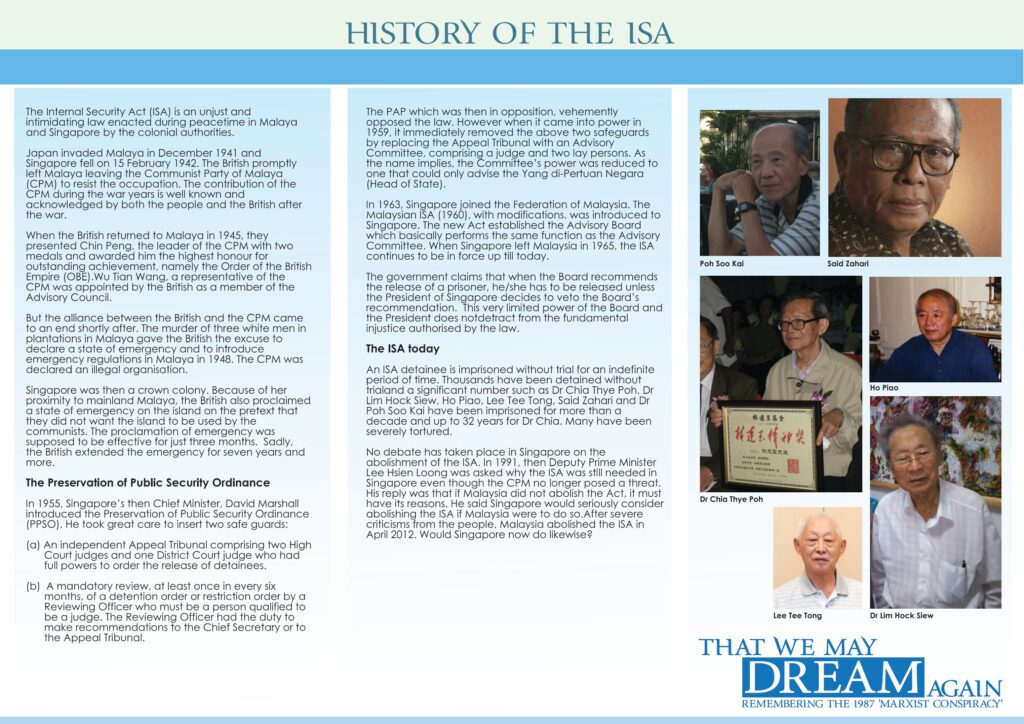
The Internal Security Act (ISA) is an unjust and intimidating law enacted during peacetime in Malaya and Singapore by the colonial authorities.
Japan invaded Malaya in December 1941 and Singapore fell on 15 February 1942. The British promptly left Malaya leaving the Communist Party of Malaya (CPM) to resist the occupation. The contribution of the CPM during the war years is well known and acknowledged by both the people and the British after the war.
When the British returned to Malaya in 1945, they presented Chin Peng, the leader of the CPM with two medals and awarded him the highest honour for outstanding achievement, namely the Order of the British Empire (OBE). Wu Tian Wang, a representative of the CPM was appointed by the British as a member of the Advisory Council.
But the alliance between the British and the CPM came to an end shortly after. The murder of three white men in plantations in Malaya gave the British the excuse to declare a state of emergency and to introduce emergency regulations in Malaya in 1948. The CPM was declared an illegal organisation.
Singapore was then a crown colony. Because of her proximity to mainland Malaya, the British also proclaimed a state of emergency on the island on the pretext that they did not want the island to be used by the communists. The proclamation of emergency was supposed to be effective for just three months. Sadly, the British extended the emergency for seven years and more.
The Preservation of Public Security Ordinance
In 1955, Singapore’s then Chief Minister, David Marshall introduced the Preservation of Public Security Ordinance (PPSO). He took great care to insert two safe guards:
- An independent Appeal Tribunal comprising two High Court judges and one District Court judge who had full powers to order the release of detainees.
- A mandatory review, at least once in every six months, of a detention order or restriction order by a Reviewing Officer who must be a person qualified to be a judge. The Reviewing Officer had the duty to make recommendations to the Chief Secretary or to the Appeal Tribunal.
The PAP which was then in opposition, vehemently opposed the law. However when it came into power in 1959, it immediately removed the above two safeguards by replacing the Appeal Tribunal with an Advisory Committee, comprising a judge and two lay persons. As the name implies, the Committee’s power was reduced to one that could only advise the Yang di-Pertuan Negara (Head of State).
In 1963, Singapore joined the Federation of Malaysia. The Malaysian ISA (1960), with modifications, was introduced to Singapore. The new Act established the Advisory Board which basically performs the same function as the Advisory Committee. When Singapore left Malaysia in 1965, the ISA continues to be in force up till today.
The government claims that when the Board recommends the release of a prisoner, he/she has to be released unless the President of Singapore decides to veto the Board’s recommendation. This very limited power of the Board and the President does not detract from the fundamental injustice authorised by the law.
The ISA today
An ISA detainee is imprisoned without trial for an indefinite period of time. Thousands have been detained without trialand a significant number such as Dr Chia Thye Poh, Dr Lim Hock Siew, Ho Piao, Lee Tee Tong, Said Zahari and Dr Poh Soo Kai have been imprisoned for more than a decade and up to 32 years for Dr Chia. Many have been severely tortured.
No debate has taken place in Singapore on the abolishment of the ISA. In 1991, then Deputy Prime Minister Lee Hsien Loong was asked why the ISA was still needed in Singapore even though the CPM no longer posed a threat. His reply was that if Malaysia did not abolish the Act, it must have its reasons. He said Singapore would seriously consider abolishing the ISA if Malaysia were to do so. After severe criticisms from the people, Malaysia abolished the ISA in April 2012. Would Singapore now do likewise?

Leave a Reply